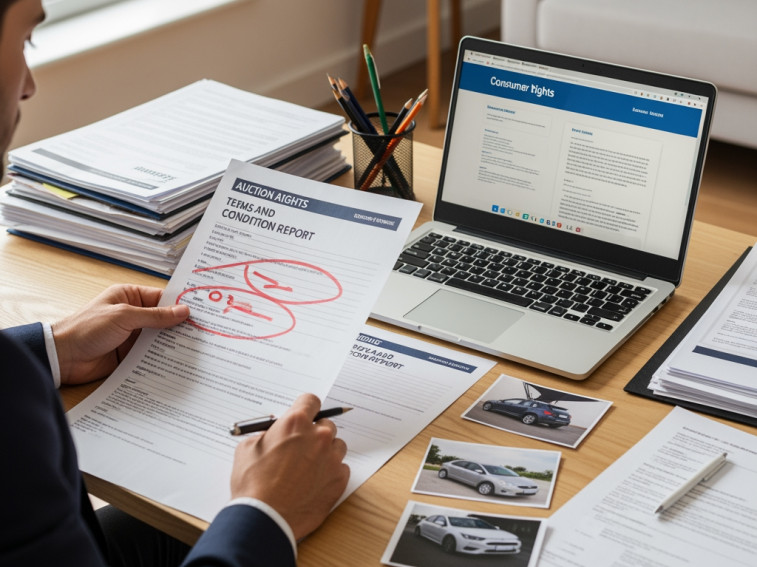Car auctions can be both exciting and challenging. While these auctions often offer great opportunities, there may come a time when something doesn't go as planned - misrepresented vehicle conditions, undisclosed fees, or unclear terms can leave you feeling disappointed. Knowing the proper procedure for filing complaints against auction houses and understanding the auction dispute resolution process is essential for protecting your rights under car auction laws and regulations.
Understanding the Legal Framework and Your Consumer Rights
Car auction houses in the UK are required to operate within strict legal guidelines, which include consumer protection laws, trading standards, and industry-specific regulations. These rules help ensure that vehicle descriptions are accurate, fees are transparent, and buyers are treated fairly.
Defining Your Concern
Begin by identifying exactly what went wrong. Whether it's a discrepancy in the vehicle's history, additional hidden fees, or any other issue, a clear problem statement forms the backbone of your complaint. Understanding your rights as a buyer empowers you to take the necessary steps for seeking resolution.
The Role of Filing Complaints Against Auction Houses
By filing a complaint, you contribute to upholding industry standards and protecting other buyers from similar issues. Remember, a well-prepared complaint not only seeks personal redress - it also strengthens overall accountability in the car auction industry through a robust auction dispute resolution process.
Preparing for Your Complaint
Thorough preparation is vital before initiating the formal complaint process. Organising all necessary documentation will strengthen your case and streamline the resolution process.
Collecting Evidence
Gather every piece of relevant documentation related to the auction:
-
Auction catalogues and detailed vehicle descriptions
-
Photographs or condition reports of the vehicle
-
Email communications and any recorded conversations
-
Copies of the auction's terms and conditions at the time of the bid
A well-documented record is essential when filing complaints against auction houses, as it substantiates your claims and supports your position during the auction dispute resolution process.
Clarifying Your Desired Outcome
Determine what resolution you are seeking. Whether you want a refund, a cancellation of the sale, or a correction of the vehicle's description, having a clearly defined goal will guide your discussions with the auction house and any involved regulatory bodies.
Filing Your Complaint: A Step-by-Step Guide
Approach the complaint process methodically to ensure every aspect of your case is covered.
Contacting the Auction House Directly
Start by addressing your concerns directly with the auction house:
Write a Formal Complaint Letter: Clearly outline your issue, support your claims with the gathered documentation, and specify the outcome you expect.
Document All Communications: Keep a record of emails, phone calls, or in-person discussions. Follow-up verbal communications with written summaries to ensure there is a formal record.
This direct approach is a critical part of the auction dispute resolution process and may resolve your issue without the need for external escalation.
Seeking Professional Guidance
If direct communication does not lead to a satisfactory resolution, consider the following options:
Consult Consumer Protection Organisations: Bodies such as Citizens Advice or the Motor Ombudsman can offer guidance on further steps and provide clarity on your rights.
Obtain Legal Assistance: For complex cases, legal experts who specialise in car auction laws can assess your situation and advise whether arbitration or litigation is a viable option.
Escalating Your Complaint to Regulatory Authorities
If the auction house fails to resolve your complaint satisfactorily, escalate your case to the relevant regulatory body. In the UK, organisations such as Trading Standards oversee compliance and may intervene on your behalf:
Submit Your Complaint Formally: Ensure that all evidence and correspondence are included with your submission.
Follow Up Diligently: Stay in contact with the regulatory body throughout the investigation process, as resolution might take several weeks or months.
Alternative Strategies and Additional Considerations
While the outlined approach is generally effective, there are additional tactics that can support your complaint resolution.
Using Social Media and Online Forums
At times, raising your issue on reputable social platforms or industry forums can prompt a quicker response. Be factual and respectful to maintain credibility, ensuring that any public post complements your formal complaint.
Leveraging Internal Resources
If you made your purchase through a trusted platform like RAW2K, explore any internal dispute resolution options provided. Many reputable auction platforms have established procedures to handle concerns efficiently. Whether you purchased through car auctions, motorcycle auctions, or van auctions, understanding the platform's internal support mechanisms can expedite resolution.
For those who prefer browsing different vehicle categories before making a purchase decision, exploring comprehensive vehicle auction listings can help ensure you're fully informed about available options and their conditions.
Final Thoughts: Contributing to a Fairer Car Auction Industry
Filing a complaint against a car auction house is about more than seeking redress for a single incident - it's about protecting the integrity of the entire industry. With detailed documentation and a systematic approach, your experience can drive improvements that benefit other buyers in the future.
Remember, every piece of feedback strengthens the auction dispute resolution process and contributes to establishing higher standards across the car auction sector. By holding auction houses accountable, you help create a more transparent and trustworthy marketplace for all participants.
For more information on securing fair vehicle transactions and understanding your rights as a buyer, explore available resources and industry guidance. If you require further assistance, personalised support, or have specific questions about the complaint process, please contact us for expert advice tailored to your situation.
By following these steps and utilising the tools at your disposal, you can confidently advocate for your rights and contribute to establishing higher standards across the car auction industry.




